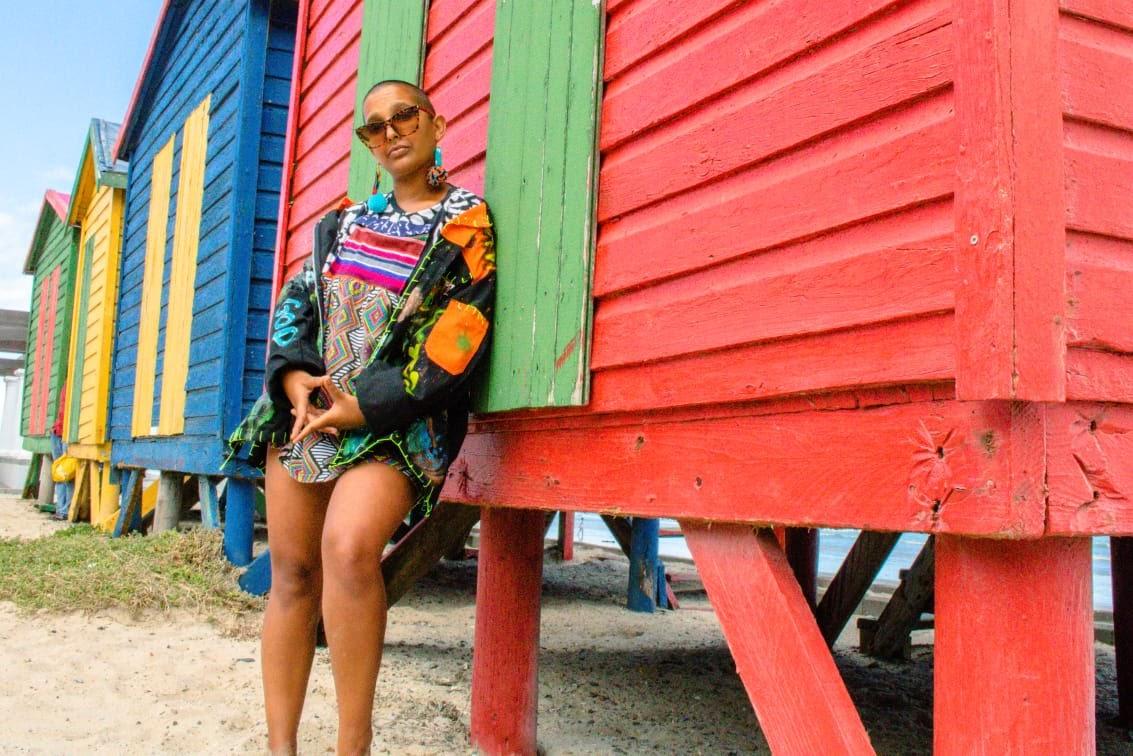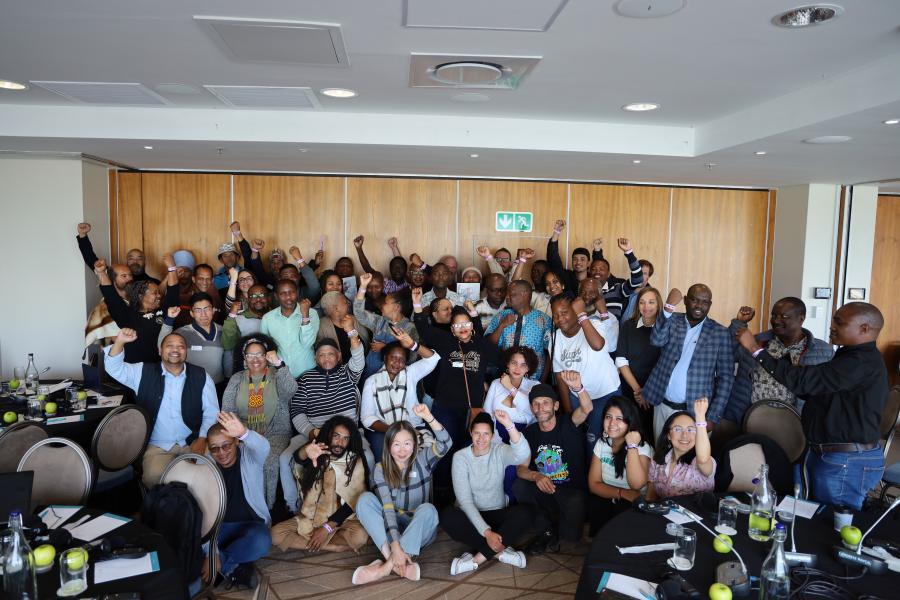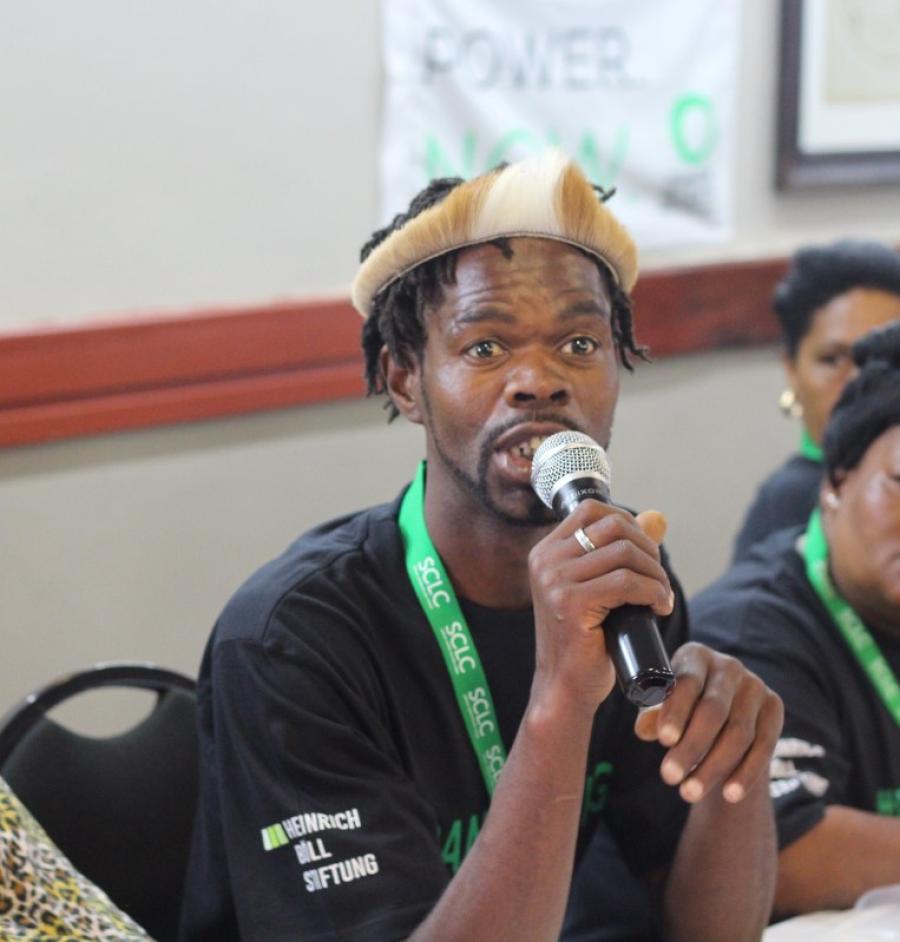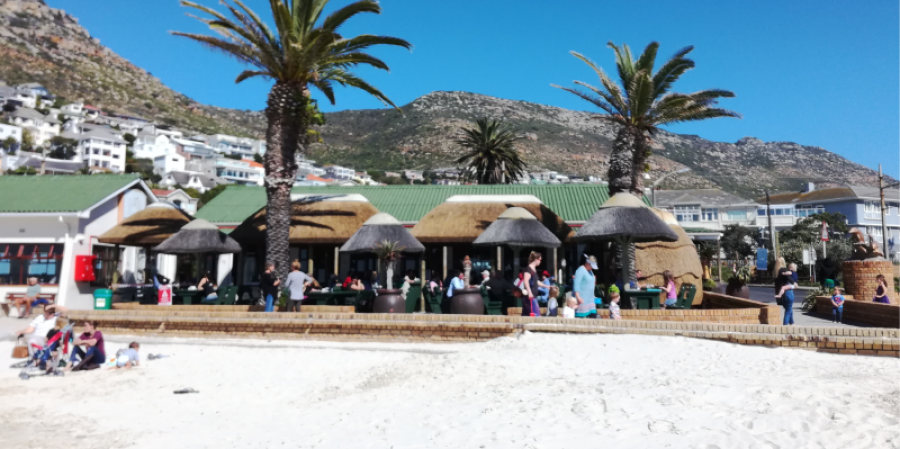
Amy Brown (Khoe) is 29 years old and identifies as Queer. She considers herself a scribe, having been in love with words since she memorized Wordsworth's “Daffodils” as a child. She was exposed to Word-Sound-Power and instantly knew she wanted to be a storyteller. Her parents' electric taste in music set her foundation for her love of song and by age seven, she was writing and performing original concerts. Brown comments, “The joy I find in being in front of an audience is a reminder from my child self that I am magic.”
After circumstances lead to her leaving university, Brown decided to focus on developing her natural talents. “Choosing words for fusing and confusions, muses and substance abuses with music has been my path since being introduced to the 021 creative realms in 2016. A brief domicile in hip hop saw me become the foremost Queer Woman of Color to compete in and dominate a local battle, Rap League. Being on stage and in the studio with esteemed artists like Jill Levenberg and Jitsvinger also added to making my stay a most pleasurable one. My creative expression has become synonymous with protest and invites to add to Queer academic spaces has seen my words endeavor to write the kind of world I want to create in,” she shares. Nati Garcia (Maya Mam), Cultural Survival Indigenous Community Media Youth Fellowship Coordinator, recently spoke with Amy Brown.
Cultural Survival: Please tell us a bit about yourself.
Amy Brown: I am a scribe and musician. I have been in love with words since childhood and have been writing and performing original compositions since I was seven years old. I am a QPOC [Queer Person of Color] from South Africa, part of a fledgling racial group known as “Coloured.” The word, recycled from America’s segregated history, callously denotes Brown people as stratified from citizens with solely African lineage. With a mixture of tricontinental ethnicities from Europe, Africa and Africa, my heritage is interesting and multi-layered. I am from a place in Cape Town, South Africa, called the Cape Flat regionally. It's a place where displaced Brown or otherwise known as “Coloured” people settled after being moved from places.
We have Southeast Asian genetics, Punjab genetics on the side of my mother, as well as Scottish genetics on the same side. On my father’s side, there are many generations back in African ties. I think, if anything, orientation in the study of dual social and I think probably leads me to like the word queer to pick that name that for myself. Because even linguistically, it gives you this idea that it's outside of some idea of someone else norm. It does mean that it isn't only an orientation that it makes people think about maybe copulating only. I think it's a mindset that comes along with part of my identity crisis if you want to call it that. It has been about the finding of the answers. I do consider myself to be an original person, of the spirit of this place but in the way that my genetic combinations, being a “Coloured” person has never existed before in the history of people colonizing other people. The construction of me as also is an original thing to this place.
I do have Aboriginal, African Khoe or Khoisan genetics and a strong want to understand how the original people of Africa lived. I also think that that's just one of the nuances within the wholeness of Brown. The next world, whatever that I mean, is rhetorical, at least for me to conceive the next idea of the next cycle of people calling themselves some marvelous barriers to get through. The nature of words is secondary to our actual communication, which is language and seeing and using and all the other things that intrinsically make us.
CS: Do you have any preference on how to refer to you, following this idea of the western classifications of "he, she/ them”? What are the terms in your language/culture?
AB: The most evolved version of Brown is less concerned about being named and more focused on being at peace. With that being said, we are living in a time where the power of words is a useful tool for the acknowledgment and integration of once marginalized Peoples.
My twin-soul, non-conforming truth has manifested in my artistic expression as well as my personal relationships. I prefer to be addressed as my self-given, “Brown.”As a linguist, the term “Queer” and the dynamic history of the word sits well with me as a descriptor for me. The idea that particular tendencies or behavior of an individual or group can, in comparison be considered odd to another. I am attracted to the word’s encompassing of “oddness” as a more common occurrence and not the singular use of it as a description of gender or sexual orientation. I find hope in the unifying reality that anyone’s “normal” is subject to being considered Queer by someone else, respectively.
I think it's a double-edged sword. On the one hand, we are able to kill these big three dragons and we can slay these linguistic problems in literature and schooling. But on the other hand, it's just like these words are not me. These words are not my experiences, I'm not writing these words for myself so that I can live a happy life. I am wanting these words so that other people who are not living a good experience, frankly, can go through their lives with love, I'm all for it.
I can feel the difference because if someone addresses me or dead names me or whatever gender words or whatever it is about, you can feel a person’s intentions that most of ourselves are nameless on a different frequency. Until we get there we have to figure out how to address each other.
Those linguistics are not a language that I consider to be a mother tongue, but one of the many Indigenous languages It stems from like Laguna culture and Zulu who don't have any gender in the grammar system, it would just be a general of them, I or theirs. English is a language of colonization and it plays into the interpretation of self.
Traditional healers and practices within the Laguna cultures of Africa, there is an almost prerequisite of twin soul or queerness as it were to be certain healers. It's one of the most leading signs that someone is called to that type of thing would be that they identify with everybody. A lot of our stories have been kept away from us, but I do think that the oldest African art, which was at some point thought to be siblings, were actually lovers, queer lovers, and it's certainly been in terms of my own, having experienced any of these things.
CS: Please tell us about your personal journey to figuring out your identity? How has this journey been for you? Within your family or within your community.
AB: I do think that every person's story is so different. I personally happen to have been born into a space where even just homosexuality, if want to call it that, as a blanket, wasn't really not abnormal, having aunties that had wives and uncles with boyfriends. Seeing all kinds of people and being exposed to a lot of things that I know this isn't the case for a lot of my peers, a lot of the people who are part of the LGBTQIA+ community. I didn't have much of a coming out as much as it was, it kind of just became introduced by the people I would bring home or hang around with. There was no tension about it. The tensions that did exist were other things, the other social realities. Growing up with parents who definitely haven't received the answers to intergenerational harms that have been done in our country's history. Having them decide to mitigate that or placate that with liberation and having a lot of questions and answering them and having myself in this space. I would say in my queerness it was really my saving grace, the fact that I was never going to be part of the mess, already gave me that superpower.
The historically forced removal and the resultant displacement of hundreds of Coloured families from their homes during the 60s caused a cultural rift that left damaging effects for my community. Once vibrant and thriving people, they were moved far from their homes, roots, and places of worship.
Today, the run-off effects of these tragedies have left embittered neighborhoods where fear is the base frequency. My generation is left with unanswered questions about our origins and those who have the truth are too hurt to share with the pride and passion that was once so prevalent.
Finding my true self, as a Queer body, coupled with the confusion caused by the lack of clarity about my history was the foundation on which I began to mold my purpose. I come from an open-minded, eclectic family where my Queerness was acknowledged but not embraced, leaving me with blanks that I knew I had to fill on my own. I consider my Queerness to be a superpower as it is the nucleus around which I am constructing me and sharing my story.
CS: What is the state of LGBTQIA+ rights in South Africa, can you speak about the LGBTQIA+ movement?
AB: Africa is already problematic, problematic is even a light word, but in Africa, there's no real love fundamentally. Some people work for not heterosexual people and in that sense South Africa is leaps and bounds ahead of the rest of the continent. This is just on paper about what it looks like constitutionally for the rights of all people. There is a little bit more consideration that's going into some of the paper stuff. But that's not necessarily true for daily practice. Cape Town is multicultural because of its proximity to the Cape of Good Hope. It's vibrant, but also seems to be a lot more open because of that. We have many queer movements in Cape Town. Some of the only three safe havens for trans people.
Sadly, African is one of the most dangerous places for Queer bodies with many countries’ policies either dismissing or criminalizing members of the LGBTQIA+ community.
The city of Cape Town that I call home is a vibrant place, a melting pot of ideologies and cultures. The Queer community is prevalent, visible, and contributing to the life-blood of arts, entertainment, and academia.
TRUE: South Africa is at the forefront with regards to inclusive and progressive policies to include and protect its unicorn citizens.
ALSO TRUE: The implications of being accepted on well-worded documents has little effect on combating institutionalized Queerphobia. The fight for justice, respect, and resources continues! My friends and I have attended too many funerals of our brethren who have lost and taken their lives because all LOVE is not acknowledged as LOVE!
A lot of movements exist in South Africa and homosexual rights and LGBTQIA+ rights and trans rights are quite advanced. Be it just on paper, even access to hormones is something that does exist and some levels of counseling and all legislature and constitutionally. It is encouraging to know that these things are being taken seriously.
CS: What are your short-term, personal, and collective goals?
AB: Being isolated during lockdown has urged me to start a journey of self-searching, recovery, and adaptation. I have been doing daily work on breaking generational cycles of addiction and dependency, attempting to heal the wounds I’ve inherited.
Reconnection with my child-self and the memory of my true heart’s desire has been my key to maintaining mental health and fuelled my creative expressions. My days are spent nervously freelance writing and giving thanks for unmarked moments which can be spent cooking and eating with my Lover. My collective goal is the hope that fear will be eased by gratitude. As we all work on loving and accepting ourselves wholly.
All photos courtesy of Amy Brown.



